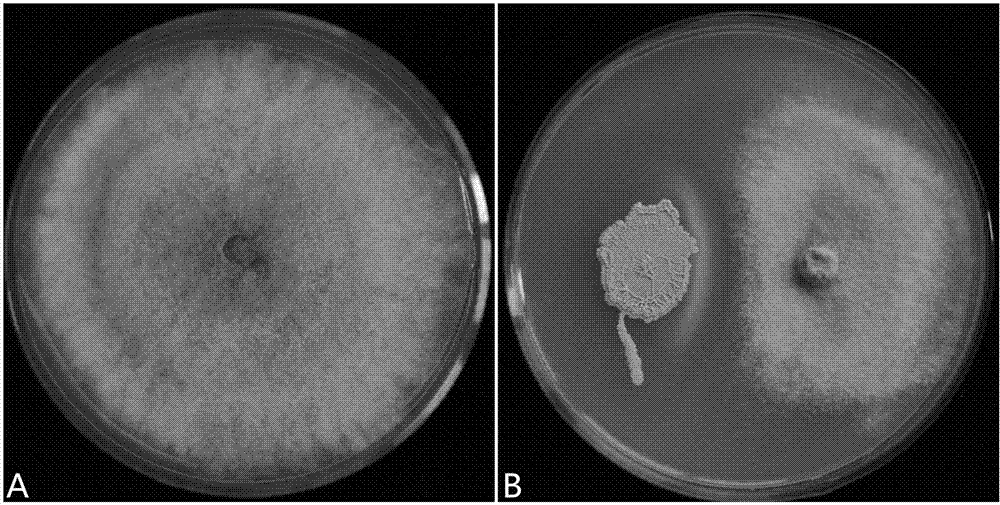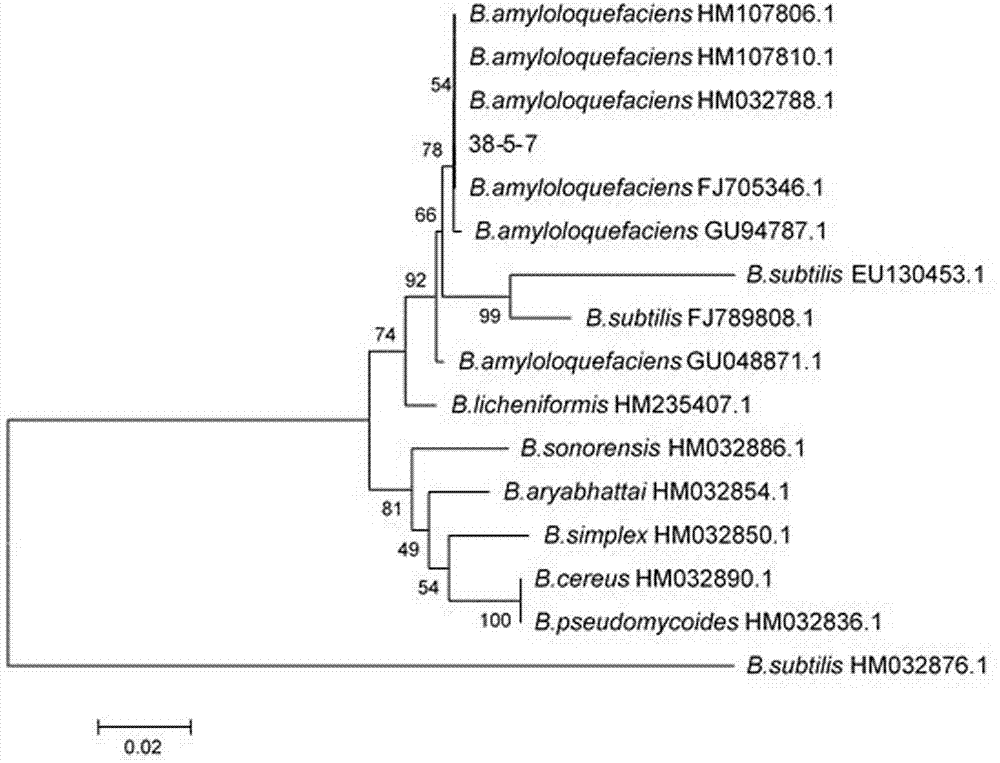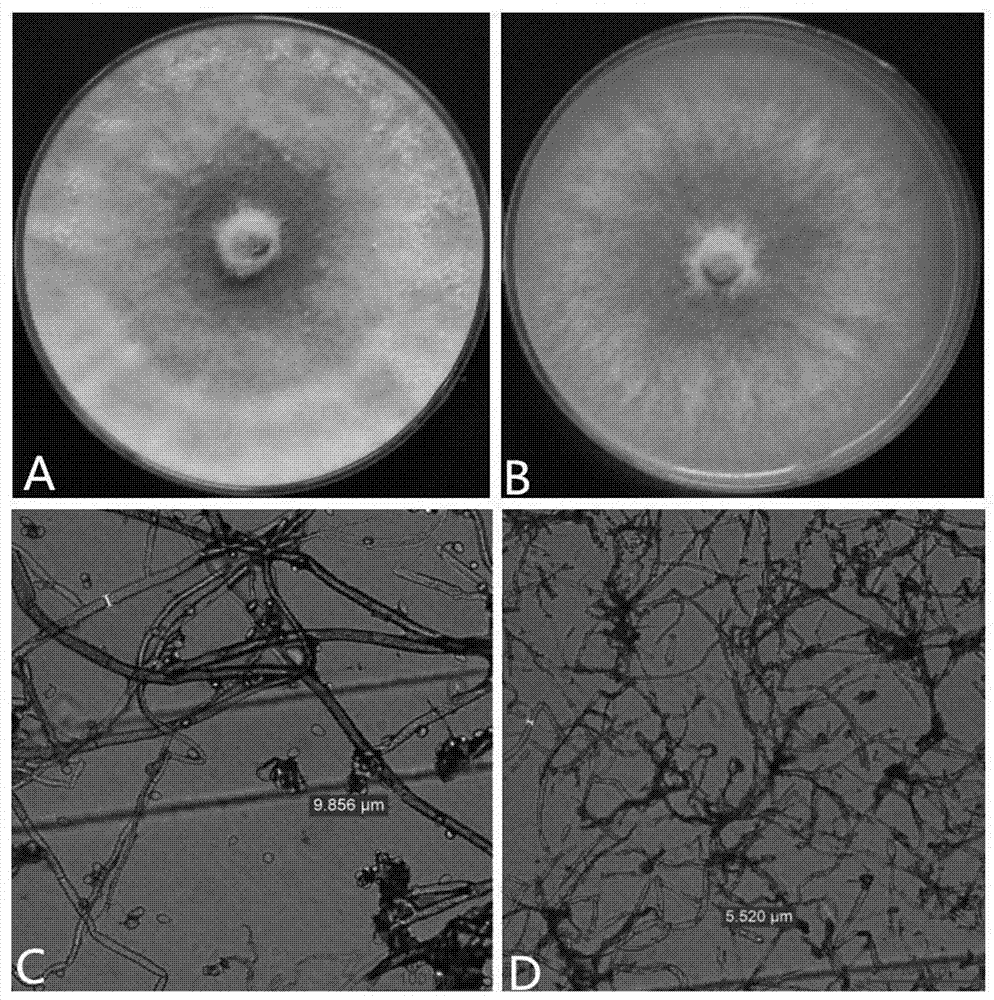Bacillus amyloliquefaciense BA-KA3 and application thereof
A technology for dissolving starch spores and bacilli, applied in the field of microbial technology and biological control, can solve problems such as easy killing of beneficial microorganisms, drug resistance of pathogenic bacteria, and increase in the cost of tomato gray mold prevention and control, so as to promote crop growth and broad-spectrum inhibition. The effect of bacterial activity
- Summary
- Abstract
- Description
- Claims
- Application Information
AI Technical Summary
Problems solved by technology
Method used
Image
Examples
Embodiment 1
[0023] Example 1 Isolation of Bacillus amyloliquefaciens BA-KA3
[0024] Bacillus amyloliquefaciens BA-KA3 was isolated from the rhizosphere soil of tomatoes in Liulintun Township, Luancheng County, Shijiazhuang City, Hebei Province.
[0025] The specific method is as follows: the rhizosphere soil of tomatoes was collected in the protected area of Liulintun Township, Luancheng County, Shijiazhuang City, Hebei Province, and stored at 4°C for the isolation of antagonistic bacteria. Dilute 5g of tomato rhizosphere soil with 0.9% saline to 10 -4 、10 -5 、10 -6 . Pipette 100 μL each into the PB medium and spread evenly with a glass spreader. After culturing in an incubator at 28°C for 3 days, bacteria with different colony shapes were picked for isolation and purification. Using Botrytis cinerea as an indicator bacterium, the antagonistic bacteria of Botrytis cinerea were screened by plate confrontation method. After culturing in the dark at 22°C for 5 days, the strains wit...
Embodiment 2
[0027] Example 2 Identification of Bacillus amyloliquefaciens BA-KA3
[0028] The strain BA-KA3 does not produce pigment when grown on LB medium, and the colonies are flat or round, milky white and opaque, and the edges of the colonies are irregular. The surface is wrinkled. Gram-positive, rod-shaped, spore-forming, spore-elliptic or cylindrical. Refer to the "Common Bacteria Identification Manual" for physiological and biochemical identification of strains: V-P test positive, methyl red test negative, indole test positive, gelatin liquefaction test positive, citrate utilization test positive, starch hydrolysis test positive, lipase negative, h 2 S production test positive, nitrate reduction test positive, malonate utilization negative, tyrosine hydrolysis negative, cellulolysis positive.
[0029] 16S rDNA sequence analysis of bacterial strains: the molecular identification of strains is carried out by amplifying 16S rDNA of antagonistic bacteria.
[0030] Forward primer...
Embodiment 3
[0036] Example 3 Indoor control effect test of Bacillus amyloliquefaciens BA-KA3 on tomato
[0037] Using sterile water as a negative control and azoxystrobin as a commonly used chemical control, the control effects of Bacillus amyloliquefaciens BA-KA3 sterile fermentation broth and bacterial suspension on tomato detached leaves, fruits and potted tomatoes were determined.
[0038] The tomato fruit and detached leaves were subjected to surface disinfection treatment, soaked in 75% alcohol for 30 seconds, and washed three times with sterile water. The cell concentration was 1×10 9 CFU / mL of Bacillus amyloliquefaciens BA-KA3, centrifuge at 8000rpm for 20min at 4°C, take the supernatant, remove the bacteria with a 0.22μm microporous membrane, and obtain a sterile fermentation broth; resuspend the precipitate with sterile water to obtain a bacterial Suspension.
[0039] Determination of the control effect of BA-KA3 on tomato botrytis cinerea in vitro: sterilized pipette tip to p...
PUM
| Property | Measurement | Unit |
|---|---|---|
| diameter | aaaaa | aaaaa |
Abstract
Description
Claims
Application Information
 Login to View More
Login to View More - R&D
- Intellectual Property
- Life Sciences
- Materials
- Tech Scout
- Unparalleled Data Quality
- Higher Quality Content
- 60% Fewer Hallucinations
Browse by: Latest US Patents, China's latest patents, Technical Efficacy Thesaurus, Application Domain, Technology Topic, Popular Technical Reports.
© 2025 PatSnap. All rights reserved.Legal|Privacy policy|Modern Slavery Act Transparency Statement|Sitemap|About US| Contact US: help@patsnap.com



